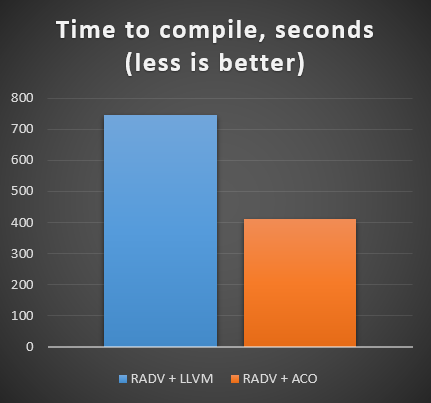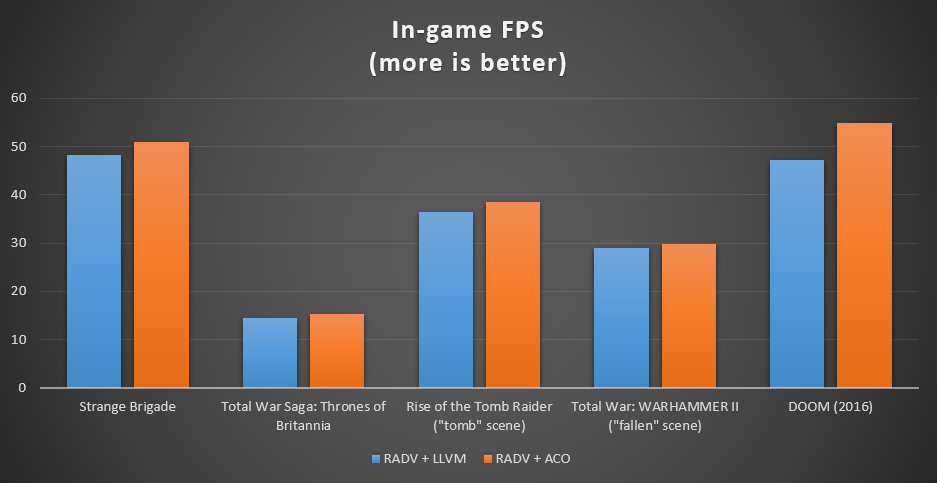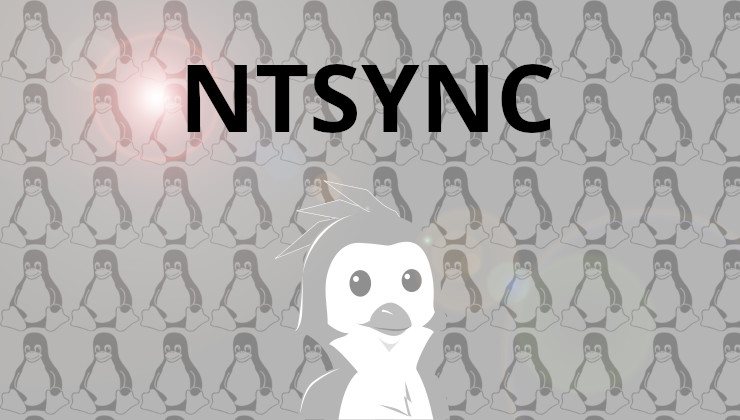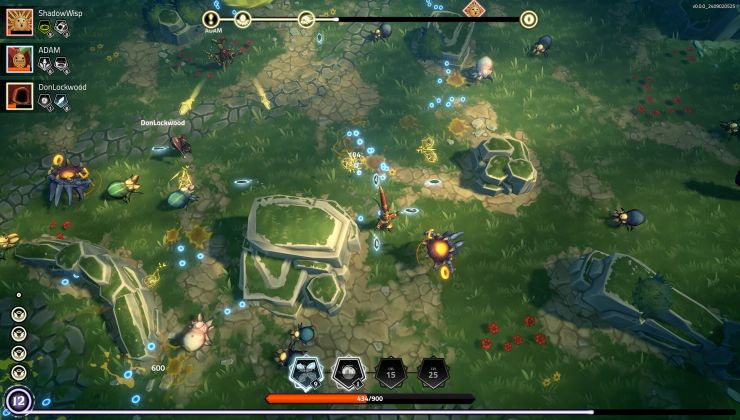Valve developer Pierre-Loup Griffais mentioned on Twitter, about a new Mesa shader compiler for AMD graphics named "ACO" and they're calling for testers.
In the longer post on Steam, it goes over a brief history about Valve sponsoring work done by open-source graphics driver engineers, with it all being "very successful". The team has grown and they decided to go in a different direction with their work.
To paraphrase and keep it short and to the point, currently the OpenGL and Vulkan AMD drivers use a shader compiler that's part of the LLVM project. It's a huge project, it's not focused on gaming and it can cause issues. So, they started working on "ACO" with a focus on good results for shader generation in games and compile speed.
It's not yet finished, but the results are impressive as shown:
That is quite an impressive decrease in compile time! They expect to be able to improved that further eventually too, as it's currently only handling "pixel and compute shader stages". Valve also included some gaming results as well. Not quite as impressive when compared to the above perhaps, but every single bit of performance they can squeeze in is great:
With more detailed performance testing info available here. Now that it's looking pretty good, being stable in many games and seeing a reduction of stuttering they're looking for wider testing and feedback. Packages for Arch Linux should be ready later today, with Valve looking into a PPA for Ubuntu too. Interested in testing? See this forum post on Steam.
You can see the full post about it on Steam and more details on the Mesa-dev mailing list entry here. The code can also be viewed on GitHub.
This comes only recently after Valve released a statement about remaining "committed to supporting Linux as a gaming platform" as well as funding work on KWin. Really great to see all this!
Take a look at the benchmark results: the difference in error. And many ports were specially sharpened under RADV - this driver has advantage.
Valve would have been able to negotiate with AMD long ago and start developing AMDVLK together. :'(
Next build (around christmas), if AMD as something to offer comparable to the GTX 1660ti (performance, price and TDP), I might give another chance to AMD in another brand (Gigabyte or Sapphire).
Also I bet you're a little proud of having this site quoted in their post Mr. "The Community" :)
Last edited by Shmerl on 3 Jul 2019 at 6:39 pm UTC
God damn, why?
Did you read their post. They answer this question.
Same. I got my current PC shortly before AMD became a solid option for GPUs again. I hate NVidia as a company and will gladly take my business to AMD next time. Won't happen too soon I guess. I tend to keep my PCs longer and longer these days.I'm in a similar position. I switched to NVidia around the start of the Linux Gaming Revolution ( :) ), and frankly I'm glad I did. It went against my open-source principles, but then so do most games, and AMD was hopeless back then. The open-source drivers were next to useless for anything other than desktop work (which, to be fair, had been fine until the games started coming), and Catalyst was an absolute mess. The way the NVidia proprietary driver Just Worked™ was a real breath of fresh air.
Now though, if I was in the market for a new GPU (which, sadly, I'm not; I managed to score a GTX960 for free a few months ago, and it'll have to do me for a while yet), I'd definitely be looking at AMD.
Had an MSI RX580 Armor 8gb for 6 months before it died on me. It was a heat generator and noisy as hell, but performances were awesome. I put the failure on MSI's bad design choices though.
Next build (around christmas), if AMD as something to offer comparable to the GTX 1660ti (performance, price and TDP), I might give another chance to AMD in another brand (Gigabyte or Sapphire).
Isn't MSI's Armor series one of the cheaper models though? Noise and heat isn't a problem with this GPU, it's a problem with that particular card. Go for something a bit more premium next time and you will be happier. Sapphire is usually a safe bet if you want a good AMD-based graphics card.
Sorry for off topic. ACO sure came as a surprise. Sounds promising. It's been well known for some time that LLVM isn't optimal for graphics shader compilation.
Last edited by Purple Library Guy on 3 Jul 2019 at 7:14 pm UTC
Had an MSI RX580 Armor 8gb for 6 months before it died on me. It was a heat generator and noisy as hell, but performances were awesome. I put the failure on MSI's bad design choices though.
Next build (around christmas), if AMD as something to offer comparable to the GTX 1660ti (performance, price and TDP), I might give another chance to AMD in another brand (Gigabyte or Sapphire).
I've had my Sapphire factory OC'd RX480 for several years now. Sure it puts out quite a lot of heat and can get little bit noisy under constant load but its been good card to own, well built and it still delivers (I can play most of the titles I own/play in 1440p and get ~60fps in reasonable detail). Drivers have been solid in recent years and overall I've been very happy with my investment and can highly recommend Sapphire cards.
Had an MSI RX580 Armor 8gb for 6 months before it died on me. It was a heat generator and noisy as hell, but performances were awesome. I put the failure on MSI's bad design choices though.
Next build (around christmas), if AMD as something to offer comparable to the GTX 1660ti (performance, price and TDP), I might give another chance to AMD in another brand (Gigabyte or Sapphire).
I've had my Sapphire factory OC'd RX480 for several years now. Sure it puts out quite a lot of heat and can get little bit noisy under constant load but its been good card to own, well built and it still delivers (I can play most of the titles I own/play in 1440p and get ~60fps in reasonable detail). Drivers have been solid in recent years and overall I've been very happy with my investment and can highly recommend Sapphire cards.
Sapphire RX480 was indeed a bit on the noisy side. They revised and improved their design quite a bit for the RX580 so despite it being basically the same GPU it was much less noisy. A lot of people were a bit let down when the RX480 came out after Sapphire completely blew their competition away with their R9 290, R9 390 and Fury but those came with a much beefier three fan heatsink similar to what you see on their Vega. These were 260-300W TDP GPU's but Sapphires awesome boards and heatsinks managed it without fuzz and their noise levels were on par with the best Nvidia based cards. I guess it was a bit overkill for the Polaris so they developed a cheaper heatsink when the RX480 came out and the first iteration was a bit noisy with fans regularly hitting >2000rpm. My Fury usually sits at 0rpm even during light gaming, and when fully loaded (260W) it hits about 1100-1200rpm, I had two of them for a while and that was a bit toastier so then they could hit 2000rpm sometimes when putting load on both cards which could be a bit too noisy for my taste.
Had an MSI RX580 Armor 8gb for 6 months before it died on me. It was a heat generator and noisy as hell, but performances were awesome. I put the failure on MSI's bad design choices though.
Next build (around christmas), if AMD as something to offer comparable to the GTX 1660ti (performance, price and TDP), I might give another chance to AMD in another brand (Gigabyte or Sapphire).
I've had my Sapphire factory OC'd RX480 for several years now. Sure it puts out quite a lot of heat and can get little bit noisy under constant load but its been good card to own, well built and it still delivers (I can play most of the titles I own/play in 1440p and get ~60fps in reasonable detail). Drivers have been solid in recent years and overall I've been very happy with my investment and can highly recommend Sapphire cards.
Sapphire RX480 was indeed a bit on the noisy side. They revised and improved their design quite a bit for the RX580 so despite it being basically the same GPU it was much less noisy. A lot of people were a bit let down when the RX480 came out after Sapphire completely blew their competition away with their R9 290, R9 390 and Fury but those came with a much beefier three fan heatsink similar to what you see on their Vega. These were 260-300W TDP GPU's but Sapphires awesome boards and heatsinks managed it without fuzz and their noise levels were on par with the best Nvidia based cards. I guess it was a bit overkill for the Polaris so they developed a cheaper heatsink when the RX480 came out and the first iteration was a bit noisy with fans regularly hitting >2000rpm. My Fury usually sits at 0rpm even during light gaming, and when fully loaded (260W) it hits about 1100-1200rpm, I had two of them for a while and that was a bit toastier so then they could hit 2000rpm sometimes when putting load on both cards which could be a bit too noisy for my taste.
Thanks! You just comfirmed what I suspected. Sapphire will probably be my next try, if AMD delivers something in my price range (sub 400$ CAN).
Thing is, when you buy a GPU, you don't buy it thinking it will break in the next 6 months. This one had really cheap fans that had bearing noise problems. None of my GTX650 (ASUS), GTX750 ti (Gigabyte) and GTX960 (Gigabyte) had these problems and I never paid for premium models. There's a minimum quality that must be respected. Not going to buy any GPU from MSI ever again.
Last edited by Mohandevir on 3 Jul 2019 at 7:51 pm UTC
I am afraid that I have a very very hard time with giving AMD another chance after the "hardware malfunction error" on my Mobility Radeon X1800. Even though that was on Windows. Even though that was 10 years ago.
Don't let this ancient experience discourage you. I have had my share of pain with AMD as well, but that is in the past. AMD is a solid choice nowadays.
https://www.gamingonlinux.com/forum/topic/3954/post_id=23861
Last edited by Shmerl on 3 Jul 2019 at 7:52 pm UTC
And then there's Nier: Automata, which sees a massive improvement (1440p rendering resolution, RX 480): [https://imgur.com/a/DBpo43T](https://imgur.com/a/DBpo43T)
Had an MSI RX580 Armor 8gb for 6 months before it died on me. It was a heat generator and noisy as hell, but performances were awesome. I put the failure on MSI's bad design choices though.
Next build (around christmas), if AMD as something to offer comparable to the GTX 1660ti (performance, price and TDP), I might give another chance to AMD in another brand (Gigabyte or Sapphire).
I've had my Sapphire factory OC'd RX480 for several years now. Sure it puts out quite a lot of heat and can get little bit noisy under constant load but its been good card to own, well built and it still delivers (I can play most of the titles I own/play in 1440p and get ~60fps in reasonable detail). Drivers have been solid in recent years and overall I've been very happy with my investment and can highly recommend Sapphire cards.
Sapphire RX480 was indeed a bit on the noisy side. They revised and improved their design quite a bit for the RX580 so despite it being basically the same GPU it was much less noisy. A lot of people were a bit let down when the RX480 came out after Sapphire completely blew their competition away with their R9 290, R9 390 and Fury but those came with a much beefier three fan heatsink similar to what you see on their Vega. These were 260-300W TDP GPU's but Sapphires awesome boards and heatsinks managed it without fuzz and their noise levels were on par with the best Nvidia based cards. I guess it was a bit overkill for the Polaris so they developed a cheaper heatsink when the RX480 came out and the first iteration was a bit noisy with fans regularly hitting >2000rpm. My Fury usually sits at 0rpm even during light gaming, and when fully loaded (260W) it hits about 1100-1200rpm, I had two of them for a while and that was a bit toastier so then they could hit 2000rpm sometimes when putting load on both cards which could be a bit too noisy for my taste.
Thanks! You just comfirmed what I suspected. Sapphire will probably be my next try, if AMD delivers something in my price range (sub 400$ CAN).
Thing is, when you buy a GPU, you don't buy it thinking it will break in the next 6 months. This one had really cheap fans that had bearing noise problems. None of my GTX650 (ASUS), GTX750 ti (Gigabyte) and GTX960 (Gigabyte) had these problems and I never paid for premium models. There's a minimum quality that must be respected. Not going to buy any GPU from MSI ever again.
Well, one of my brothers had three different GTX970's, some from MSI and some from Gigabyte. They're good GPU's but one of them were semi passive and one of it's fans had trouble spinning up so the card would run really hot due to only one fan spinning. Another (or was it the same?) died after a MOSFET burned up. Yes it was overclocked, but they're supposed to be able to handle that and there are safety features built in that are supposed to stop that from happening. Stuff can happen to Nvidia-cards as well but I guess they're a bit more forgiving due to those GPU's generally using less power.













 How to set, change and reset your SteamOS / Steam Deck desktop sudo password
How to set, change and reset your SteamOS / Steam Deck desktop sudo password How to set up Decky Loader on Steam Deck / SteamOS for easy plugins
How to set up Decky Loader on Steam Deck / SteamOS for easy plugins
See more from me